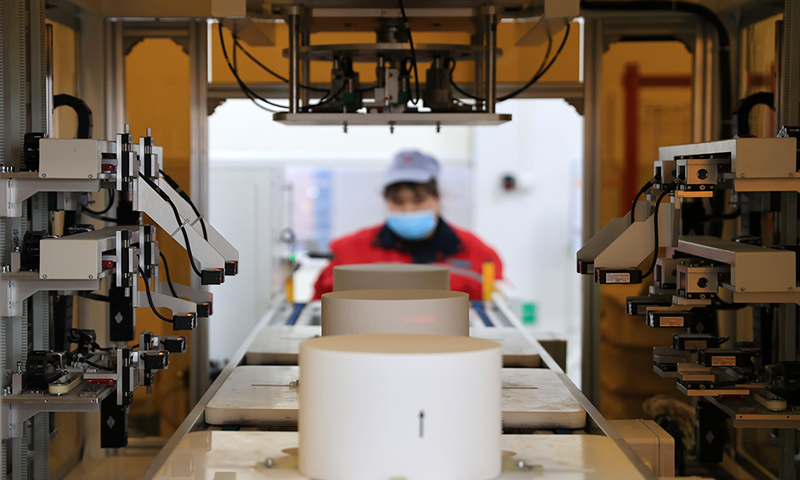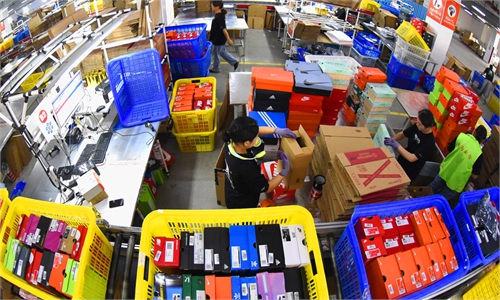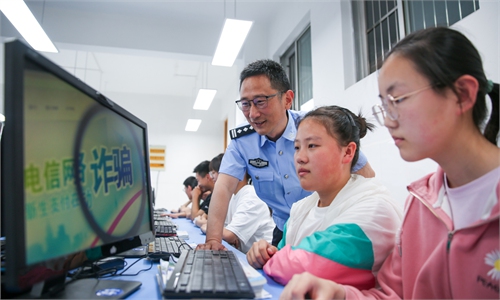Chinese technology companies report improved financial returns post-pandemic
Nation pins hope on private companies to spearhead recovery: expert

An employee watches as an AI industrial visual system inspects the quality of particulate filters for cars at a factory in Dongying, East China's Shandong Province on February 24, 2023. The system has an accuracy rate of over 99 percent in detecting 32 types of defects. Photo: cnsphoto
Chinese internet-based technology companies have improved their performances and ramped up investment, as shown by their half-year financial results, reflecting the robust development of the country's private economy post-pandemic.
Despite the challenges facing China's economic recovery, the innovation-driven tech companies have shown resilience and exceeded expectations in terms of business revenue, as the private sector is regaining momentum and vitality, experts said.
Xiaomi held its 2023 annual investors conference on Monday. During the conference, founder and chairman Lei Jun said that Xiaomi's research and development investment will exceed 100 billion yuan ($13.8 billion) in the next five years. Lei also announced a strategic upgrade, focusing technological innovations, upgrades for software and hardware and artificial intelligence (AI) empowerment.
iFlytek, a leading AI company based in Hefei city, Anhui Province, said on August 11 its second quarter's business operations improved and made up for the unfavorable situation of the first quarter's revenue decline caused by the COVID19 pandemic and US government sanctions.
Its revenue reached 4.95 billion yuan, up 9.68 percent year-on-year and growing 71.56 percent quarter-on-quarter.
The impressive results were achieved despite the challenges posed by US sanctions. iFlytek was first included in the US Entity List in 2019 and faced harsher sanctions on October 7, 2022, along with 28 other leading Chinese tech companies and institutions in the fields of AI, high-performance chips and supercomputers.
The financial statements said that the company, in response to extreme US pressure, has invested in core technology independence. It has been actively investing in large-scale cognitive models for generative AI.
Alibaba, another major player in the Chinese internet industry, said its quarterly revenue as of June reached 234.16 billion yuan, up 14 percent year-on-year.
The strong financial performance of technology companies has surpassed expectations, Hu Qimu, deputy secretary general of the digital real economies integration Forum 50, told the Global Times on Tuesday.
The achievements suggested their consistent focus on R&D have paid off, Hu said.
The improved performance of technology companies reflected the strong recovery of the Chinese economy, Liu Dingding, an independent technology industry observer, told the Global Times on Tuesday.
The easing of the pandemic and the implementation of growth-reinforcing policies created a favorable environment for tech companies to grow, Liu said.
The Chinese government has implemented policies aimed at encouraging the private sector that focuses on innovations.
On August 1, major Chinese departments jointly announced 28 measures to stimulate the vitality of private enterprises.
The measures stated support for private enterprises in participating in major technological breakthroughs and taking the lead in key tasks in areas such as industrial software, cloud computing, AI, industrial internet, bio-medicine, and new-energy storage.
The policies will alleviate burdens on private enterprises and promote entrepreneurial activities. This will further boost confidence and encourage private enterprises to actively engage in their tech innovations, Liu said.
Supported by the favorable measures, major technology enterprises will play a bigger role in emerging fields such as the digital economy, green energy, lithium batteries, and automobiles.
The Shanghai Municipal Commission of Economy and Information on Tuesday announced policy support to achieve breakthroughs in "bottleneck fields" and the priority industries of the future, including brain-computer interfaces, synthetic biology, AI, quantum communication and 6G.



